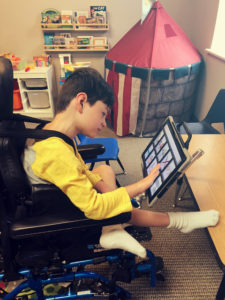Our speech, physical, and occupational therapists are trained to work with children and young adults with a variety of challenges and abilities. Treatment is not determined by a client’s diagnosis, rather by the symptoms that limit their ability to function. Most often, we treat patients with the following diagnoses:
AUTISM SPECTRUM DISORDERS (ASD)
A developmental disorder that impacts social development and behavior. Related diagnoses include: Asperger’s Syndrome and Pervasive Developmental Disorder Not Otherwise Specified (PDD-NOS)
SENSORY PROCESSING DISORDER
A disorder in which the brain has difficulty organizing and making sense of information from the senses
HYPOTONIA (LOW TONE)
A state of low muscle tone which may also involve decreased muscle strength; sometimes called ‘floppy baby syndrome’
DEVELOPMENTAL COORDINATION DISORDER
A delay in motor skills or difficulty coordinating movements
APRAXIA OF SPEECH
An oral motor speech disorder that results in difficulty speaking
DYSPRAXIA
A neurological disorder that impacts a person’s ability to plan and execute motor tasks. Individuals with dyspraxia may be described as ‘clumsy’
DEVELOPMENTAL DELAYS
Delays in any area of child development- developmental milestones, gross motor skills, fine motor skills, intellectual skills, social skills, speech and language skills
CEREBRAL PALSY
A disorder of movement, muscle tone, or posture
DOWN SYNDROME
A genetic disorder resulting in developmental delays
EXPRESSIVE & RECEPTIVE LANGUAGE DISORDERS
Disorders characterized by difficulty understanding other’s speech or expressing oneself using speech
MOOD DISORDERS
A group of disorders that impacts a person’s mood, including bipolar disorder and disruptive mood dysregulation disorder
ATTENTION DEFICIT DISORDERS (ADD/ADHD)
A condition characterized by difficulty paying attention, hyperactivity, and impulsivity
EXECUTIVE FUNCTIONING DISORDER
Sometimes referred to as ‘executive dysfunction’, executive functioning skills allow us to plan, organize, pay attention, stay on task, multi-task and more
OPPOSITIONAL DEFIANT DISORDER
A disorder characterized by frequent and persistent patterns of anger, irritability, and defiance
ANXIETY
Characterized by nervousness, fear, worry, apprehension
FAILURE TO THRIVE
Refers to insufficient weight gain or inappropriate weight loss
PRE-MATURITY
LEARNING DISABILITIES
A neurologically based processing problem that interferes with one’s ability to learn reading, math, and/or writing. These include dyslexia, dyscalculia, and dysgraphia
VISUAL DISORDERS
Including visual impairments, low vision, difficulties with visual perception and more
GENETIC DISORDERS
STUTTERING
ARTICULATION DISORDERS
Difficulty articulating or making specific speech sounds
AUDITORY PROCESSING DISORDER
Difficulty understanding or processing what other people are saying, which impacts the ability to follow directions, understand speech in busy environments, and discriminate between different sounds

